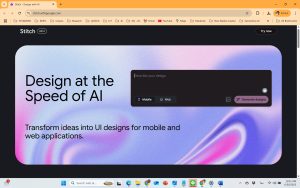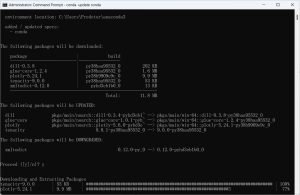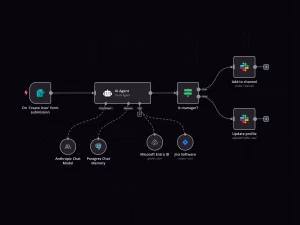Open Source CMS ปี 2022
จุดเปรียบเทียบ
– Plugins & Themes Support
– User Interface
– Customizability
1. WordPress (https://wordpress.org)
Undoubtedly, WordPress is one of the most popular CMS platforms. You can either make a blog or even build an e-commerce site thanks to it. WordPress is a very user-friendly website creation tool.
When considering the stats, WordPress occupies almost 64% or more of the total market share among all the other open-source CMS’.
Well, It’s FOSS also utilizes the WordPress CMS. You do not have to worry about the security patches on this platform because the dev community is super active to keep the platform up-to-date with new features and fixes. The majority of online publications rely on WordPress to manage their content, including us at It’s FOSS.
2. Ghost (https://ghost.org)
Ghost is a simpler alternative to WordPress if you just want to focus on your content structure and SEO. You won’t really get the ability to add unique features to your website because Ghost is specifically tailored for a good user experience focused on the content instead of extra features.
If you want your content to stand out along with a modern website design (and no fancy features)—Ghost should be the perfect open-source CMS in that case. It even offers a subscription system for your visitors out of the box to monetize your blog.
You can host Ghost on your Linux server or opt for their managed hosting platform that takes care of everything from installation to configuration. Managing the security and backups is also in the hand of the Ghost team so that you can focus on creating content, not managing servers.
3. Drupal (https://www.drupal.org)
Drupal is considered to be one of the best enterprise open source CMS. It isn’t as easy as WordPress, though. So, you need to read some documentation before jumping right into the platform.
Similar to WordPress, Drupal offers modules (as plugins) to add more functionality to your website. Of course, you do not get numerous modules (when compared to WordPress). But, it is perfectly customizable (almost close to what WordPress offers).
You can even try to utilize it for an e-commerce website, healthcare portal, and various other use-cases.
4. Joomla (https://www.joomla.org)
Joomla is yet another impressive open-source CMS. In fact, Joomla has the capability to create websites for different use cases like portals, business websites, online magazines, E-Commerce, online reservations etc.
Joomla has a short learning curve and provides free video training to quickly build sites. Joomla also provides Joomla! Framework through which more advanced features are unlocked for those organizations that need them.
5. Jekyll (https://jekyllrb.com)
Jekyll is a static site generator. It takes text written in your favorite markup language and uses layouts to create a static website. You can tweak the site’s look and feel, URLs, the data displayed on the page, and more.
6. TYPO3 (https://typo3.org)
TYPO3 CMS is an Open Source Enterprise Content Management System with a large global community, backed by the approximately 900 members of the TYPO3 Association.
7. Microweber (https://microweber.com/get-started)
If you are on the lookout for something very easy and that lets you manage your content in no time—Microweber definitely is the choice to go with.
It also supports e-commerce integration, but with a limited set of features. The marketplace for this CMS isn’t huge, but features a lot of modern website designs. It is a no-nonsense open-source CMS to showcase your content by utilizing modern website templates while being able to manage it effortlessly.
8. PyroCMS (https://pyrocms.com)
PyroCMS is a fairly new CMS that has been evolving since 2015. It aims to make the website creation process a lot faster and simpler. With a variety of modules, you can add more functionalities to your website.
PyroCMS isn’t a recommendation if you want a full-fledged blog. So, if you want a very simple yet elegant blog – with no plans to add advanced functionalities to the site – PyroCMS is the way to go.
Built on the worlds most popular PHP framework.
9. SilverStripe (https://www.silverstripe.org)
If you mostly utilize your desktop to manage the content of your site – SilverStripe can be an old-school CMS with basic website design templates. Unless you have some coding skills or hire a web developer, SilverStripe won’t be easy to customize as per your liking.
10. Fork (https://www.fork-cms.com)
The fork is yet another basic CMS with a couple of handy extensions available. It has been around since 2010 and is still being actively maintained. So, if you want an easy CMS coupled with few useful extensions/themes – Fork should be the right one to set up.
11. Zenario (https://zenar.io)
Zenario is an interesting open-source CMS that you probably never heard of. It is a very simple yet innovative platform to manage content on. It is being utilized to make online portals for applications and portfolio sites.
12. ProcessWire
ProcessWire is also a quite popular open-source CMS that web developers seem to like. Personally, I’m not a fan of its UI while being so used to WordPress—but if I give an unbiased opinion on it—it’s a really fascinating CMS worth trying out.
Furthermore, I’ve noticed many web developers recommend it as a better option to WordPress from a technical point of view – making it even more interesting as an open-source CMS available.
13. Publii (https://getpublii.com)
Static Site CMS with GUI to build a safe, fast and SEO-friendly website.
Publii is a powerful blogging app perfect for anyone looking to create a privacy-focused website. Whether you’re a beginner or a developer, it has all the tools you need to get started.
14. Mixcore (https://mixcore.org)
Mixcore is a fully open-source CMS UI Toolkit. With the tools provided, you can create multipurpose enterprise web apps, mobile Apps & Application Services etc.
Mixcore CMS is built on top of Bootstrap 5 and is secure with strong data encryption and security compliance. It offers a Google Analytics dashboard in-built and is also SEO-friendly without the requirement of additional plugins.
If you are looking for something that helps you build, and create something ambitious, you can give this a try.
15. Backdrop CMS (https://backdropcms.org)
Backdrop CMS is a free and open-source content management system, forked from Drupal in 2013 by two Drupal Developers. It offers more than 750 modules, themes, and layouts to select from.
Backdrop CMS can serve pages fast, even on shared hosting. It is being actively developed, and actively maintained. Furthermore, it works great on phones and tablet.
16. ModX (https://modx.com)
ModX is an Open-Source Content Management system, which is blazing fast and secure. It aims to target businesses, not just individual bloggers.
There are community-made elements, extensions, and integrations called Extras similar to other CMS extensions to increase functionality. And you get some customizability as well.
17. Grav (https://getgrav.org)
Grav is a modern open source flat-file CMS. It runs out-of-the-box with no configuration required.
It supports HTML and Markdown. It also provides version control and sync support and smart caching.
According to their website, it is the only CMS with native support for properly displaying images on Retina and HiDPI displays.
19. XOOPS (https://xoops.org)
XOOPS is a web application platform written in PHP for the MySQL database. Its object orientation makes it an ideal tool for developing small or large community websites, intra company and corporate portals, weblogs and much more.
19. Magento / Adobe Commerce (https://business.adobe.com/products/magento/open-source.html)
Magento is a popular open-source CMS tailored for e-commerce businesses. It is now better known as Adobe Commerce. But, the open-source edition is still known as “Magento Open Source”.
You can choose to opt for the hosted solution or download the open-source edition to host it yourself.
The community edition (or the open-source edition) – is free to use and also houses a lot of necessary functionalities needed for a web blog or an e-commerce site.
This may not be easy-to-use, to begin with – but it is a good option to explore.
—
ที่มา:
https://itsfoss.com/open-source-cms/











